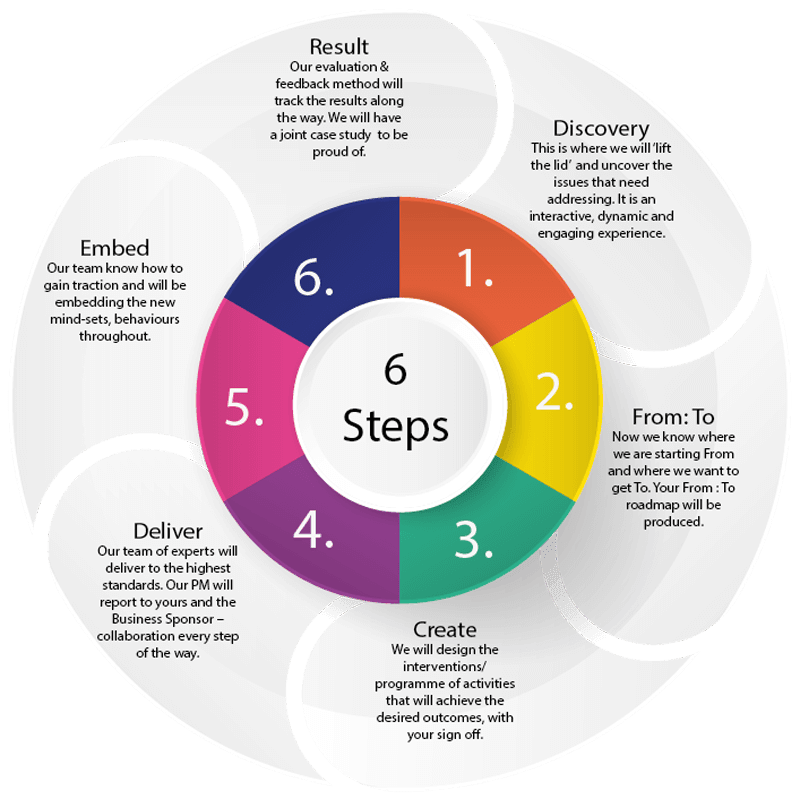As a wise man once said, ‘With great power comes great responsibility.’ And when it comes to artificial intelligence in the workplace, that couldn’t be more true. AI has the power to transform organisational culture in profound ways – for better or for worse. So let’s explore how we can harness the power of AI for good and avoid any potential pitfalls along the way.
Pros of AI & Culture
Increased efficiency and productivity:
One of the clear advantages AI confers is the increase in efficiency and productivity, something the majority of UK businesses currently need help with. Through automating repetitive tasks, AI allows employees to focus on other, more creative and/or higher-value work leading to a more efficient and productive workplace culture where employees have more time and energy to pursue innovative ideas. A study by PwC found that AI has the potential to increase UK GDP by up to 10% by 2030 through increased efficiency and productivity gains. The study estimated that AI could generate over £232 billion in additional GDP by 2030 and create thousands of new jobs.
Culture benefits from this in a plethora of ways. Firstly, through automating tasks, the mundane workload can be reduced, which in turn, can help reduce stress and burnout by allowing employees to focus on more meaningful work. A study published in the Society for Human Resource Management in 2019 showed that employees with access to AI-enabled tools for administrative tasks were more likely to report less stress and higher productivity. Another study in the Journal of Business Research in 2020 found that this led to lower burnout. Doing so can therefore help create a culture that values work-life balance and employee well-being. A happier workforce is a more productive one, after all.
Secondly, AI can improve the accuracy of these tasks reducing the risk of errors and improving overall work quality. McKinsey & Company found it can reduce errors in tasks like data entry and processing, resulting in accuracy rates of 95% or higher. This can contribute toward a culture of excellence and quality.
Improved decision-making:
As AI can store, analyse, and interpret large quantities of data extremely quickly and accurately, AI can help organisations make data-driven decisions. A study by Accenture found that AI can improve decision-making by up to 90% and reduce errors by up to 30%. The study also found that AI can help organisations identify new opportunities and improve customer experiences. The benefits are vast and depend on the specific application of AI. However, on the whole, this can lead to a more objective and transparent decision-making culture, where decisions are based on data rather than subjective opinions, consequently reducing conflict. Letting AI make difficult decisions fairly and objectively can eliminate arguments, disagreements, or conflicts between members of the organisation. Overall, this creates a more positive and harmonious work environment, which can improve employee satisfaction and retention.
Moreover, AI can move decision-making from days or weeks to more real-time due to batch-based reporting. This can dramatically impact the culture of a firm and how the company needs to work to maximise the benefits. Whether this impact is positive or negative is primarily down to the implementation and execution.
Another positive is that AI can aid with hiring and promotional decisions by analysing the candidate data without considering factors such as age, race, gender, or ethnicity. By reducing bias, AI can bolster diversity and inclusivity, creating a more inclusive culture where employees are valued for their skills and abilities, regardless of their demographic characteristics. There are few things as powerful as diversity and inclusion when fostering a positive culture.
However, it must be acknowledged that whilst AI does not have the capacity to bias results with its own beliefs, if AI systems are designed, intentionally or unintentionally, to include biases then using the system will amplify biases in data and algorithms, leading to discriminatory outcomes. The University of Cambridge found that AI algorithms used in hiring decisions can perpetrate existing biases and discriminations. Careful application is therefore required to ensure algorithms are built to minimise bias.
Increased social responsibility and sustainability:
AI can help bolster ESG policies. By optimising resource use, reducing waste, and minimising environmental impact, AI can help organisations to become more socially responsible and sustainable. This can be especially useful in smaller organisations that don’t have the capabilities to assess this effectively themselves. Deloitte’s found that AI can achieve this, facilitating organisations to achieve their sustainability goals and improving their reputation among customers and other stakeholders.
The impact of genuinely impactful ESG mandates on organisational culture is a well-researched and supported notion. It can create a culture that values social and environmental responsibility, where employees feel proud to work for an organisation that positively impacts society and the planet. This could improve job satisfaction, employee retention and recruitment.
Con’s of AI & Culture
However, like with most things, it’s not all rainbows and butterflies; integrating AI into all aspects of culture can have an adverse impact which requires mitigation.
Job displacement and insecurity:
Arguably the largest, or at least loudest, concern about integrating AI into the workforce is potential job displacement and insecurity. As discussed above, AI can automate repetitive administrative tasks; for example, if this is someone’s full-time job, it would be more economical for the organisation to opt to use AI instead of hiring them. AI would consist of a more substantial one-off payment but does not require breaks, holidays, sick days, pension contributions, and so on, so in the long term would substantially reduce the organisation’s overheads. Introducing such technology can therefore create a culture of fear, uncertainty, and stress, negatively impacting morale and engagement. Moreover, this fear is not entirely misplaced; McKinsey Global Institute experts have admitted that AI’s impact will be complex and varied. What is certain is that some jobs will become redundant in the future, with McKinsey estimating that between 400 and 800 million jobs worldwide could be displaced by 2030.
It’s important to note though that automation does not always mean job losses as it can open opportunities to reskill employees and turn them from a cost centre to a profit centre. For example, Ikea is providing training to call centre employees to transform them into interior design advisors. The furniture giant has extended its range of home improvement services while delegating routine customer inquiries to an AI bot named Billie, Reuters report. Since 2021, IKEA franchise Ingka has successfully trained 8,500 call centre workers to serve as interior design advisors, meanwhile, the AI Bot has effectively managed 47% of customer queries over the past two years. So while there is a lot of conversation about AI-powered automation leading to a potential reduction in headcount, Ulrika Biesert (Ingka Group Global People and Culture Manager) has stated:
‘That’s not what we’re seeing right now….We’re committed to strengthening co-workers’ employability in Ingka through lifelong learning and development and reskilling, and to accelerate the creation of new jobs.’
One can only imagine the impact this decision has had on Ikea’s culture. Job displacement is therefore not a given and can be mitigated by thoughtful leadership where companies embrace these changes, finding new opportunities for staff and creating more value for customers.
Erosion of privacy and personal autonomy:
Privacy and personal autonomy are also hot topics when it comes to AI. The technology inherently collects and analyses large amounts of personal data, which raises concerns about privacy, data protection, and autonomy. The relationship between the law and technology has always been a bit like a cat-and-mouse chase, with the cat personifying the law. Our judicial system is one of the oldest features of our society and is, therefore, inherently ill-equipped to deal with the exponential progress of technology like AI. This is relevant because erosions of privacy that are morally wrong may not always be illegal straight off the bat, meaning organisations will somewhat bear the burden of morality. For example, regarding data privacy, the UK government introduced the first data protection legislation in 1984, several decades after the development of magnetic tape storage and hard disk drives. Moreover, before the 2018 Data Protection Act came into play, the ruling legislation was the 1998 Act, designed for a pre-digital age. This means that from 1998 to 2018, the law did not fully account for the impact of digital technology on data protection, illustrating the problem.
Organisations that want to foster trust both between their employees and customers therefore must consider the moral implications of AI-related data storage themselves and not rely upon the law to do it for them. A poignant example of a situation where extra consideration is required is included in a study within the Journal of Business Ethics, which found that using AI in employee monitoring can lead to increased surveillance and erosion of privacy. The study ultimately recommended that organisations consider ethical guidelines for using AI and ensure that employees are aware of the technology’s capabilities.
Deterioration of skills:
For all AI’s positives, sometimes the mere act of automating can erode important soft and hard skills. It's common knowledge that regularly practising skills is the best way to improve and maintain them, as skills are developed through repeated practice and refinement. AI can provide quick and easy answers to complex problems; for example, it can erode critical thinking skills and hinder employee creativity and innovation. Eventually, this could lead to a culture of complacency and reliance on technology. A study published in the International Journal of Human-Computer Interaction found that users of AI-powered personal assistants tended to rely on technology for simple tasks and became less capable of performing those tasks without assistance. The study concluded that the use of AI could hurt users’ cognitive abilities and decision-making skills over time.
Moreover, this could be especially true for soft skills. Wide-scale integration of AI could result in a loss of human connection and empathy for both employees and customers. The Journal of Business Research found that using chatbots in customer service interactions can lead to decreased customer satisfaction and emotional connection. Overall, this can negatively impact employee morale and engagement, as well as customer satisfaction and loyalty.
However, it’s important to note that AI can be used as a training aid to help up-skill junior staff. Improving personal and professional development opportunities, especially among the younger generations, can be an extremely effective way to build loyalty and improve satisfaction. Moreover, by eliminating repetitive/monotonous tasks this can free staff up to focus on more complex tasks requiring human creativity and problem-solving. So although it may deteriorate some basic skills, it may grant more opportunities to practice complex ones.
Conclusion
AI has the potential to supercharge your organisation’s culture – we’re talking about improved efficiency, better decision-making, and a more socially responsible and sustainable workplace. But don’t get too starry-eyed because there are risks, like job displacement, deterioration of skills, and a lack of human touch.
Like most things culture-related, it all comes down to execution and implementation.
So, before you hand over the keys to the robot overlords, ensure you’re maximising the benefits, mitigating the risks, and implementing strategies to keep things running smoothly.
With the right approach, we might just create a world where humans and machines can coexist without the drama of a sci-fi blockbuster.
Follow us on LinkedIn for more content.






